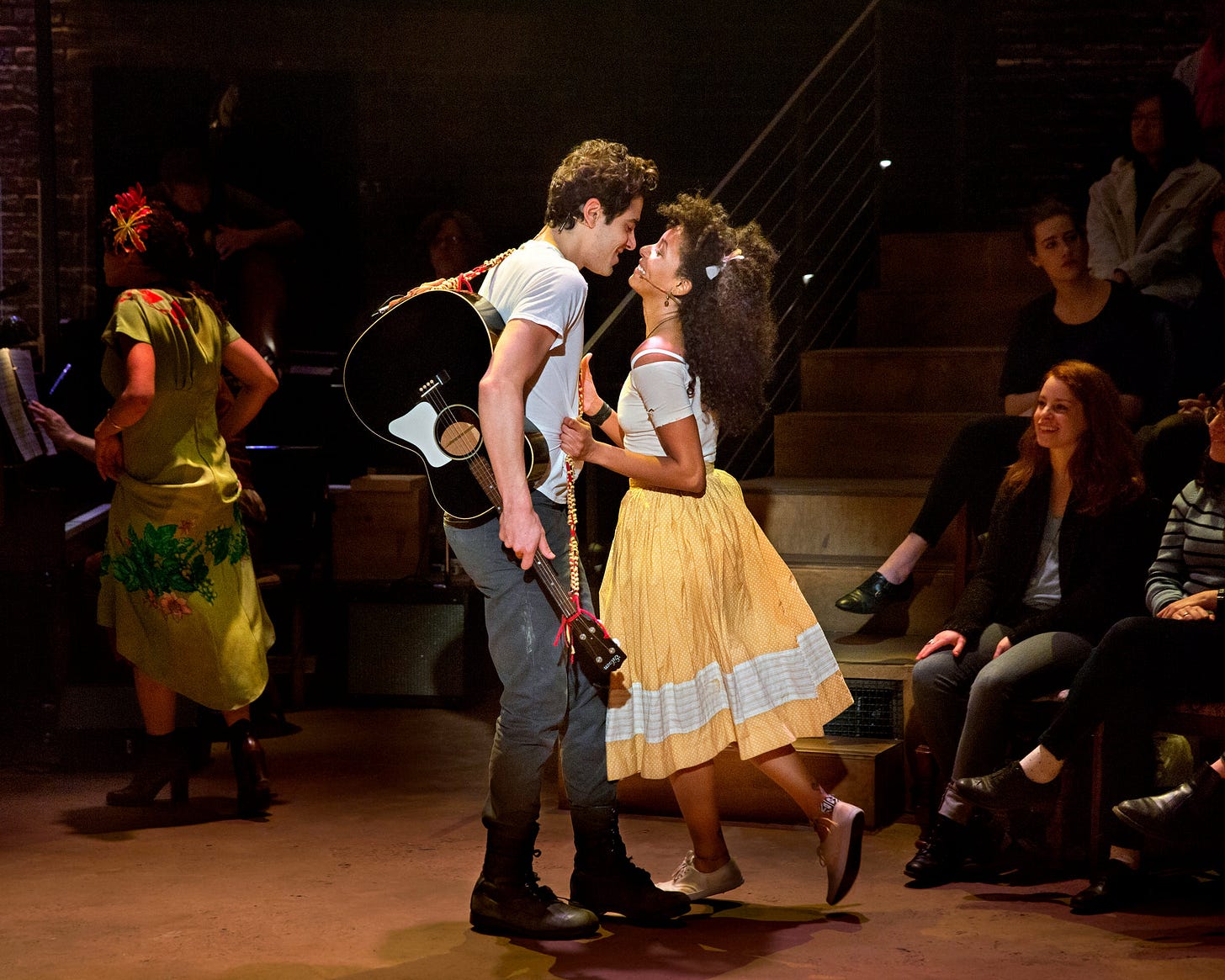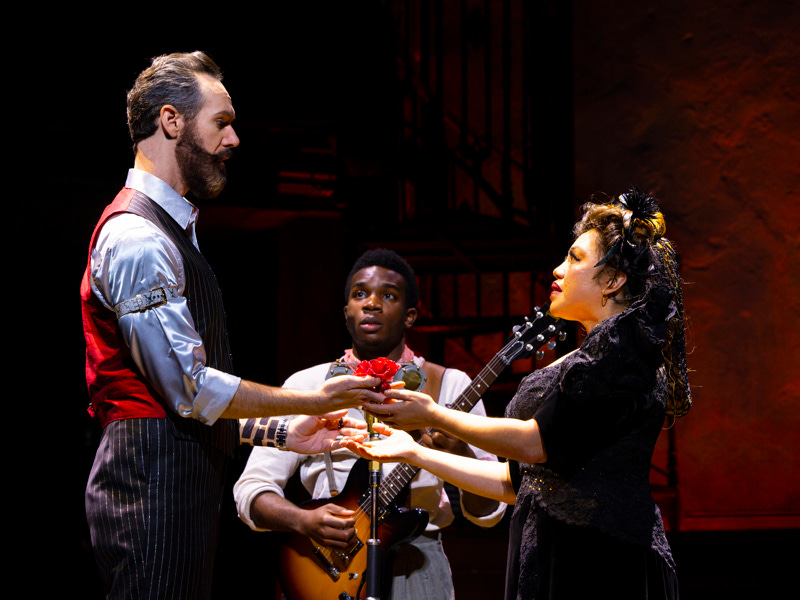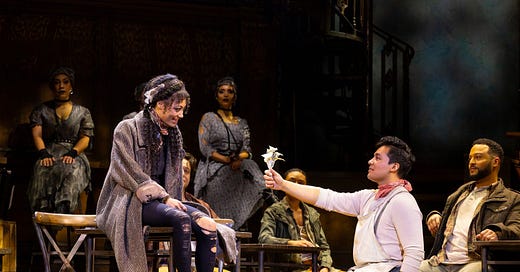Hadestown is a musical retelling of the ancient Greek myth of Orpheus and Eurydice in a world stricken by intense seasonal depression. Or, the one in which he retrieves her from the underworld but can’t turn back… spoiler, he does.
Hermes: Nathan Lee Graham Orpheus: J. Antonio Rodriguez Eurydice: Hannah Whitley Hades: Matthew Patrick Quinn Persephone: Maria-Christina Oliveras
Last week, on the 13th, I saw Hadestown at the Orpheum Theatre during its matinee performance with one of my best friends for the second time. I was lucky enough to see it last summer at its last San Francisco show, and I was even more excited to see it again.
The musical, conceived by folk singer-songwriter Anaïs Mitchell in 2006 and later directed by acclaimed stage director Rachel Chavkin, parallels two pairs of ancient Greek lovers in a Great Depression-esque atmosphere. The show has come a long, successful way since, currently on Broadway, a National Tour, and slated for a West End premiere in early 2024. Narrated by the clever Olympian god Hermes, Hadestown follows mortals Orpheus & Eurydice, as well as gods Hades & Persephone.
Orpheus, a poor boy working on a song he’s determined will change the world, is able to see the world as it could be in spite of the way that it is. Eurydice, a hungry young girl, in spite of herself and her nature to see the world as it is, falls in love with Orpheus. In this world of gods and man, Hades rules the industrial underworld, in which his wife, Persephone, visits for six months every year–becoming more bitter at the increasingly labor-intensive changes each time. To escape the “poverty and cold,” Eurydice goes down to the underworld, “and her poor singer-songwriter lover Orpheus comes to attempt to rescue her.”12
Hadestown exemplifies an adaptation done right. Translation is a fickle thing, but the ancient world is brought back to life through the grand and ancient story of love and loss. A quote that struck a chord with me during my first encounter with poet Alice Oswald’s Memorial: A Version Of Homer’s Iliad reads:
My approach to translation is fairly irreverent. I work closely with the Greek, but instead of carrying the words over into English, I use them as openings through which to see what Homer was looking at. I write through the Greek, not from it – aiming for translucence rather than translation.
While the effort behind finding a perspective for a story 25 centuries old may come up dry, finding its translucence may not be. Hadestown is a show that makes it worth living for the world you dream about, despite the one you live in now.
ORPHEUS: And that is the reason we’re on this road And the seasons are wrong And the wind is so strong That’s why times are so hard It’s because of the gods– The gods have forgotten the song of their love
- Chant
EURYDICE
From the very moment the music started I was cataloging where everyone was until I hit Orpheus and Eurydice’s placement and was like, “Oh shit, that’s who's playing Eurydice/Orpheus???” I instantly fell in love with their characters.
Eurydice’s voice was insanely strong and driven by emotion3, I found her to be one of the most standout performances. Whitley plays Eurydice not as an innocent or naïve girl who’s unaware, rather, as one who has made a choice and accepts that she has to stick with it. Previously, in the show’s 2016 Off Broadway production for the New York Theatre Workshop, the show emphasized Eurydice’s more docile and scared role. Nabiyah Be, the production’s Eurydice, is described by The New York Times’ Charles Isherwood as:
[having] a luminous beauty that makes Orpheus’s quick fall quite believable, and her singing is equally spellbinding. She also imbues the character with a transparent innocence that makes Eurydice’s susceptibility to doubt and seduction palpably believable.4
Whitley’s characterization of a steely Eurydice comes with caution, similar to Be’s, but more so learned caution, as if she’s done this before. Eurydice clings to Orpheus and what he offers– the feeling of being alive. Akin to some Reddit opinions I skimmed prior to the drafting of this article, I felt that Whitley’s vocal performance at times, note-speaking, fell flat and her enunciation blended. I’m in no way a vocal or even musical professional so I can’t say too much on that point, however, if I’m honest, It doesn’t even detract from my glimmering opinions of her. I appreciated her potent performance.
When Eurydice is forced to go down into the underworld for her survival, she may not to the full extent of her actions, but she knows that it may be her only choice – she can’t wait on Orpheus to finish his song, to “bring back spring,” bring back life as it was.
HERMES: But he had a gift to give He could make you see how the world could be In spite of the way that it is And Eurydice was a young girl But she’d seen how the world was When she fell She fell in spite of herself In love with Orpheus
- All I’ve Ever Known (“In spite of herself…”) [Intro]
ORPHEUS
On the topic of vocals, I found Rodriguez’s vocal performance of Orpheus to just slightly be lacking. I promise this isn’t me trying to “fluff” my criticism, but even then, it just felt so right for his characterization. Similar to Chibueze Ihuoma, who I previously saw live as Orpheus, Rodriguez made for a sweet, yearning, earnest Orpheus. One you believe truly would go down into the underworld for his love.
I swear, less than 10 minutes into the show I was already sobbing. Rodriguez and Whitley had an undeniable chemistry. In the push-and-pull of “All I’ve Ever Known” where Eurydice finds herself falling for Orpheus, the beauty of their love shines through. The blend of their voices creates an immensely satisfying pair.
EURYDICE: Suddenly the sunlight, bright and warm– ORPHEUS: Suddenly I’m holding the world in my arms
- All I’ve Ever Known
Cue tears.
And I must say, he absolutely delivered on the crux of the musical: the song “Wait For Me” in which Orpheus firmly commits himself to performing katabasis, or, a journey into the underworld for the sake of saving Eurydice. Even before, when he finds out Eurydice called his name but he was too busy working on his song to hear her, guilt falls on Rodriguez’s movement.
Not unlike what I’ve seen and heard about the originator of Tour Orpheus – Nicholas Barasch and his celestial voice5, Rodgriuez makes the audience root for him, you want Orpheus to succeed. My classicist mentor Kat once pointed out the stage direction wants Orpheus to be unapologetically devoted to Eurydice, near comically so. When Hades pointedly looks at Eurydice after she sings, “kinda makes you wonder how it feels [to have so much financial power]” with the intention of having her sell her soul, making her work for a living, calls for Orpheus to in an exaggerated manner, leap in front of Eurydice, covering her from Hades. Rodriguez does not leap, but his step in front of her is assured. While he doesn’t know how much he can protect, considering he’s a poet and Hades is an industrial tycoon, he’s firm in his belief that he and his love for Eurydice can be safe against anything.
This is to contrast against the popular Reeve Carney, the originator of the Broadway Orpheus role. Before I summarize my grievances against his acting choices for Orpheus, I must ask why I ever trusted the ex from Taylor Swift’s “I Knew You Were Trouble” music video / the star from the charmingly inefficient Spider-Man: Turn Off The Dark / the guy dating is 13-years-junior costar (sorry to throw you under the bus a little, Eva, love you to death!), but I suppose that’s for another time. I’m afraid I’m not for the worship of someone who played Orpheus so condescending. Where Rodriguez steps in front of Eurydice for his love of her, Carney steps in front of Eurydice but stares down Hades and curls his fists–for anger, not love.
And since I’ve mentioned Carney and I’ve previously mentioned Nabiyah Be, I must add a little tidbit on how Damon Daunno’s version of Orpheus from the 2016 NYTW production is actually my favorite. I can’t help but fall for his James Dean, suave Orpheus, who’s confident, sure, but it’s warranted. Though Broadway’s (former) Eurydice, Eva Noblezada, and Carney are dating, the dynamic of a charismatic poet and a bright but cautious girl that Daunno and Be had was truly invigorating.6 Or perhaps it’s from the fact that Daunno sings my favorite line in the show’s history:
“Let the world we dream about me the one we live in now” opposed to the Broadway and Tour versions, which now sing “To the world we dream about, and the one we live in now”

PERSEPHONE: He has the kind of love for her that you and I once had HADES: The girl means nothing to me PERSEPHONE: I know, but she means everything to him
- How Long?
IMMORTALS
Hermes’ casting of Nathan Lee Graham was not my favorite, but I understood its importance. I previously saw Levi Kreis play Hermes which was… interesting, for sure. Maybe unnerving, is the better word. Kreis had a very exuberant, overly stage-y persona that I didn’t feel fit the role of Hermes in this story, and was vastly different from André De Shields, the Broadway Hermes. When it’s revealed that the story is indeed a cyclical tale, and of course Hermes knows it, De Shields is regretful where Kreis was seemingly mandated to feel pity.
Graham’s voice lilts and more forceful choice of emphasis rang slightly dry to me, but I suspect this was because of Kreis’ previous role. Hermes wasn’t as active as I thought he would be either, nothing about the script or the songs changed, but Hermes did not seem as invested in the son of his so-called “old friend.”
Hades and Persephone were a completely different story. Hades felt fleshed out, not necessarily more so than his previous counterparts, but Matthew Patrick Quinn left room for audience’s understanding. Quinn made Hades compelling–you understood Hades’ harshness but also the reason behind it, his love for Persephone, his trying to win her back through industry, how he ends up stifling her instead, creating an environment of hostility in his domain of the dead.
It was in this production that I made the connection of Persephone being such a bridge. Which is also why I mourn the loss of the original Chant II’s lines, in which Persephone sings:
When I was a young girl like you Sister, I was hungry too Hungry for the underworld When I was a young girl Now you know how it tastes The fruit of Mr. Hades’ ways Sister, it’s a bitter wine-- Spit it out while you still have time Take it from a woman of my age Love is not a gilded cage All the wealth within these walls Will never buy the thing called love
There’s a very high chance I blacked out and don’t remember this moment in my show, but usually Hades and Persephone go back and forth on the rotating floor, circling and lamenting to their counterparts on the perils of their love, what greed has done to it.7 This show was curiously missing it. Even despite Persephone losing her lines, she still manages to advocate for Eurydice, all the while showing the dynamic of her own love.
Not only is Persephone the one who’s entire life and cycle revolve around moving between the over and underworld: softening Hades while also being the reason for his growing hell-ish underground, providing for the mortals in the show, she connects the audience to the characters. In “Our Lady Of The Underground”, Persephone introduces the musicians to the audience, has the audience cheer, and at the very end of the show, she starts singing “We Raise Our Cups”, directly speaking to the audience and acknowledging Orpheus’ role.
Maria-Christina Oliveras not only fulfilled Persephone’s multi-faceted role but exceeded it, allowing for the narrative, the love to shine through.

ROAD TO HELL (REPRISE)
The (second to) last song of the show, “Road To Hell (Reprise)” is somber, occurring right after the climatic act of Orpheus looking back. Hermes reminds the audience that every single show, it has to happen, and he knows it does, yet…
HERMES: To know how it ends And still begin to sing it again As if it might turn out this time I learned that from a friend of mine
Even compared to impressive past shows and productions, Hadestown’s North American Tour carves its own narrative within a narrative, one of hope despite the odds.
Here is a link to a much better synopsis + overall production story of Hadestown by Polyphonic:
“The Story of Hadestown”, YouTube, uploaded by Polyphonic, November 26 2020
A very legal clip of Whitley singing “All I’ve Ever Known”:
“Hannah Whitley All I’ve Ever Known in Toronto 6/5”, YouTube, uploaded by Peyton Chen, July 27 2023
Actually legal clip of Barasch singing “Wait For Me”
““Wait For Me” clip”, YouTube, uploaded by Tours To You, October 14 2021
Not to detract from Noblezada at all. She’s still my favorite Eurydice by at least a mile ;)






Also, I appreciate your criticisms to the show, and how every individual playing a character can have an impact or change the chemistry of the interactions in song or on stage! Really liked your notes on this!
Hadestown!! One of the most underrated adaptations of Orpheus and Eurydice imo. So glad you enjoyed the show! For now, I can vicariously live through you and hope to hear "Wedding Song" and "Way Down Hadestown" one day in person. Thanks for sharing :)